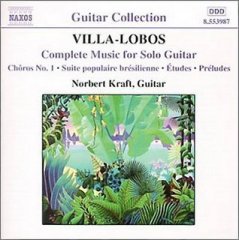Heitor Villa-Lobos – Complete Music For Solo Gitar (Kraft) [2000]
Heitor Villa-Lobos – Complete Music For Solo Gitar (Kraft) [2000]

01. Choros No. 1 (Typico) 02. Suite Populaire Brésilienne No. 1 Mazurka - Chôros 03. Suite Populaire Brésilienne No. 2 Schottisch - Chôros 04. Suite Populaire Brésilienne No. 3 Valsa - Chôros 05. Suite Populaire Brésilienne No. 4 Gavota - Chôros 06. Suite Populaire Brésilienne No. 5 Chôrinho 07. 12 Études, No. 1 Allegro Non Troppo 08. 12 Études, No. 2 Allegro 09. 12 Études, No. 3 Allegro Moderato 10. 12 Études, 4 No. 4 Un Peu Modérè 11. 12 Études, No. 5 Andantino 12. 12 Études, No. 6 Poco Allegro 13. 12 Études, No. 7 Très Animè 14. 12 Études, No. 8 Modérè 15. 12 Études, No. 9 Très Peu Animè 16. 12 Études, No. 10 Très Animè 17. 12 Études, No. 11 Lent - Animè 18. 12 Études, No. 12 Animè 19. 5 Préludes, No. 1 In E Minor 20. 5 Préludes, No. 2 In E Major 21. 5 Préludes, No. 3 In A Minor 22. 5 Préludes, No. 4 In E Minor 23. 5 Préludes, No. 5 In D Major Norbert Kraft - guitar
Norbert Kraft has long been associated with the coordination of the classical guitar repertoire that the super-budget label Naxos has so successfully marketed in recent years. So it only seems appropriate that it is Norbert Kraft that here performs the Complete solo guitar works of Heitor Villa-Lobos - works that are central to the core repertoire written during the first half of the 20th century, works that all guitarists seem to regard as essential to their repertoires and works that also have stood the test of time.
Certainly there is an abundance of recordings of all of these pieces (particularly the 5 Preludes) so it is questionable whether further versions would enrich an already long list. However, given the range of classical guitar music in the Naxos catalogue they would be conspicuous by their absence.
The Chôros, a popular musical form similar to that of a rondo, was performed by street musicians in the cities of Brazil. Villa- Lobos was a guitarist, so it is significant that he chose the guitar for the first in his set of fourteen Chôros, all written for various instruments. To guitar enthusiasts of a certain age it is safe to say that their first experience of this work was probably Julian Bream's 1962 recording, and although at times it does bear Bream's idiosyncratic style (in particular the dwelling over the second measure of bars 10 and 12 marked 'rall' that occurs with each repeat of the section) I am sure that if Villa -Lobos had heard the recording he would have approved. Consequently any subsequent recordings that does not indulge itself in a like manner somehow seems lacking. Never the less, Norbert Kraft's reading still has its own qualities.
The Twelve Études of 1929 has been described as the guitarists equivalent of Chopin's piano Etudes Op. 10 and 25, works of a didactic nature to expand the guitarists technique. This does seem to be the case for the earlier études (1-6), indeed the first three are devised to develop arpeggio playing. But by the time we reach étude No. 7 pieces are worthy of inclusion in concert programmes, which many guitarists over the years have done. Whatever their purpose, a technique of the highest standard is required, a technique that Norbert Kraft possesses which has enabled him to produce one of the most convincingly assured performances of this set.
In writing Suite Populaire Brésilienne Villa- Lobos used his wide musical knowledge to create an exotic blend of 19th century European dance forms with the rhythms of the Brazilian Chôros. Although written between 1908 and 1912 it was only after the other works found popularity that guitarists seeking alternative pieces by Villa-Lobos turned to these, the earliest of his guitar compositions.
Perhaps over familiarity through numerous recordings has over the years diminished the impact that the 'Five Preludes' (1940) had on first hearing (even with selective purchasing I have seven sets of these Preludes in my collection). So it is not surprising that making comparisons is unavoidable, and though Norbert Kraft's view of these works has many commendable points in their favour, they still do not replace my own first choice of Julian Bream's 1971 set . (N.B. Norbert Kraft's version of Prelude No.3 is the second recent recording that for some reason does not observe the written repeat.)
It is probably true that any disc of such well known works is open to hypercriticalness, but on the whole this recording ranks as one of the best available interpretations of this music. I can recommend it to anyone wanting the complete solo guitar works of Villa-Lobos on one disc. ---Andy Daly, musicweb-international.com
download: uploaded yandex 4shared mediafire solidfiles mega zalivalka filecloudio anonfiles oboom
Last Updated (Wednesday, 18 June 2014 12:53)








